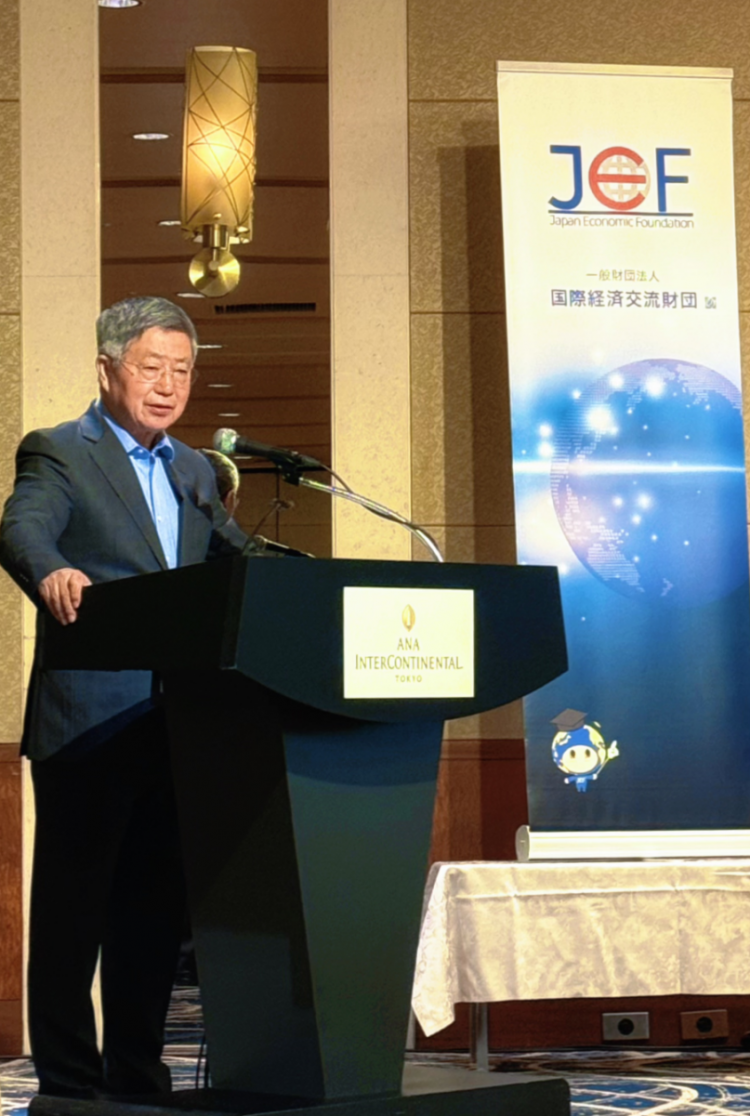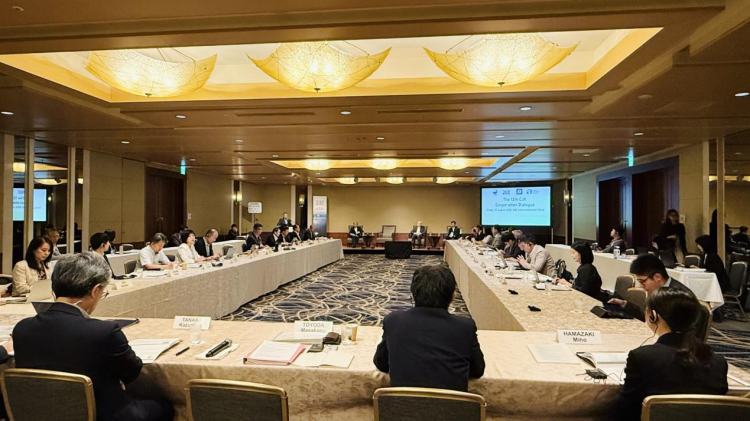The 12th CJK Cooperation Dialogue Held in Tokyo, Japan
On August 22, 2025, the 12th CJK Cooperation Dialogue was held in Tokyo, Japan. Hosted by Japan Economic Foundation (JEF), China Institute for Reform and Development (CIRD), and East Asia Foundation (EAF), with special support of Trilateral Cooperation Secretariat (TCS). The dialogue focused on the theme of "Enhancing Trilateral Cooperation Amid Shared Economic Challenges". Scholars from the three countries exchanged views on issues of common concern, including strengthening rules-based free trade in East Asia, trilateral collaboration on climate change and energy technologies and energy technology, and trilateral opportunities in tourism enhancement.
Opening remarks were delivered by Masakazu Toyoda, Chairman and CEO of JEF; Chi Fulin, President of CIRD; Kim Sung-hwan, Chairman of EAF and Lee Hee-sup, Secretary-General of TCS. Welcome Addresses were made by Kazushige Tanaka, Director-General for Trade Policy of Manufacturing Industries Bureau of Japan's Ministry of Economy, Trade and Industry; Guo Qiang, Counselor for Economic and Commercial Affairs of Embassy of the People’s Republic of China in Japan and Kyungrok Jung, Minister Counselor of Embassy of the Republic of Korea in Japan.

Professor Chi Fulin delivered an opening remark themed "CJK Free Trade Agreement: The Optimal Choice Amid Common Challenges".
Professor Chi addressed that, first of all, the CJK Free Trade Agreement (FTA) is the optimal choice to adapt to the trend of regional economic integration. Regional economic integration with free trade as its core is an irreversible trend. Adapting to this trend and achieving a major breakthrough in CJK free trade will drive the world economy into an "Asian era". Secondly, the CJK FTA is the optimal choice to advance RCEP regional cooperation. The conclusion of such an FTA will play a leading role in upgrading RCEP from version 1.0 to 2.0. Thirdly, the CJK FTA is the optimal choice to meet practical needs. The key is to build on and make good use of the RCEP framework to reach the CJK FTA as soon as possible.
Professor Chi put forward three suggestions: Firstly, conclude a CJK free trade arrangement that goes beyond the RCEP at an early date. This includes reaching consensus on rule alignment and mutual recognition of standards in trade in services, and accelerating the implementation of high-standard economic and trade rules in emerging fields such as the digital economy. Secondly, accelerate mutual market opening. He proposed that China expand access to its automobile and medical health markets for Japan, and open up its cultural and entertainment market wider to South Korea. He also suggested formulating and implementing a high-standard negative list for cross-border trade in services among the three countries, and taking the lead in fully implementing RCEP tariff reduction commitments within the next 1 or 2 years, so that the proportion of "zero tariffs" among the three countries reaches around 90%. Thirdly, strengthen trilateral working mechanisms. He recommended holding a summit of government leaders of China, Japan and South Korea within the year to promote major breakthroughs in free trade negotiations, and giving full play to the role of think tanks from the three countries.

The one-day dialogue included discussions on topics of "Strengthening Rules-Based Free Trade in East Asia: Implications of US Policy", "Trilateral Collaboration on Climate Change And Energy Technologies" and "Trilateral Opportunities in Tourism Enhancement". Over 40 participants attended the Dialogue, including Chinese scholars such as Zhang Yunling, Member of the Chinese Academy of Social Sciences and Chair Professor of Shandong University; Zhou Weisheng, Distinguished Professor at Zhejiang University and Director of Research Institute of Global 3E; Zhao Jinping, Vice President of China Association of Trade in Services; Guo Yanjun, Professor of the Institute of Asian Studies at China Foreign Affairs University. Japanese and ROK participants included Naoyuki Yoshino, Emeritus Professor at Keio University of Japan; Ahn Choong-Yong, Distinguished Professor at Chung-Ang University of ROK, as well as youth representatives.
Yang Rui, Executive President of CIRD; Kuang Xianming, Vice President of CIRD; Guo Da, Executive President of Hainan Institute for Free Trade Port Studies; and Liang Hui, Secretary-General of CIRD–GRANDALL Center of FTP Law Studies.
 中改院
中改院
 官方微信扫一扫
官方微信扫一扫 官方微信扫一扫
官方微信扫一扫